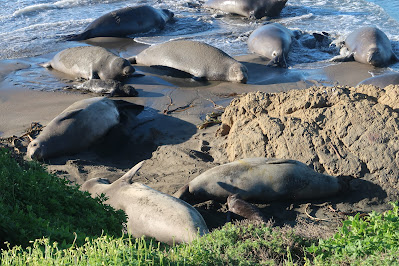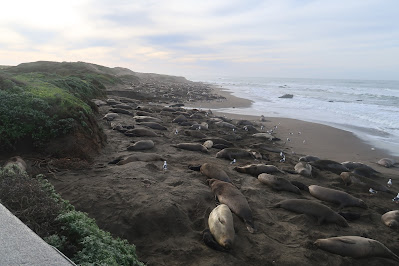Pups are at risk
Winter is birth and breeding season for elephant
seals. Weather and King Tides always pose risks, but this season’s storms have
been particularly damaging. Many seal pups were washed away as waves inundated
the entire beach in parts of the Piedras Blancas rookery.
The elephant seal viewpoint beaches were completely
covered by waves during the first set of storms in early January. Nearly all
the pups that had been born on the north beach and many on the south were swept
away. Watching them struggle was terrible.
The north beach.
The south beach.
Both north and south beaches were
inundated.
Mothers do their best, but waves often overtake them.
Powerful waves pounded the beach.
This pup found refuge behind rocks, in a pile of
kelp.
Jim Mentgen, a Friends of the Elephant Seal docent for
four years, watched over the pups for hours over several days.
“I was impressed with how resilient the pups are,” he
said. “Even though they were less than a week old, I watched some fight for two
or three days against the waves.”
Two of the seven pups he observed survived.
Winter birth season
The first week of January is the beginning of the
birthing season. A hundred or so seal pups had been born. More mothers,
eventually over 5,000, will come to the rookery, from the lighthouse to a mile
south of the viewpoint, to have their pups before the last is born in March.
The waves washed away some of the sand that provided high
ground for the seal pups. Less beach is left above high tide line.
At the south end, enough beach is exposed for mothers
arriving since the first storm to have their pups. That works until high tides,
including King Tides, return January 17-23.
Elephant seal mothers and their pups fill the
beach above high tide line.
Many mothers have returned to give birth on the beach.
They are doing well and their pups are fine. As they nurse and gain weight,
they will be better able to overcome high tides later in the month.
This pup is getting fat nursing on his mother.
Her belly is pock-marked with cookie cutter shark scars.
Pups need their mothers
Elephant seal pups have some ability to swim when they
are born, but they don’t have enough blubber to stay warm and they aren’t able
to feed themselves. They can’t survive in the ocean. Just being separated from
their mothers can be fatal. Maternal-pup separation is the most frequent cause
of pup death.
However, many mothers tolerate nursing pups other than
their own. Over 80 percent of pups, even under less severe conditions, nurse on
mothers other than their own. The mothers who lost their pups may be willing to
adopt orphaned pups.
“In
my experience, events like these cause a lot of confusion and mixing of mothers
and pups,” Patrick Robinson, director of
the Ano Nuevo Reserve, said in an email.
Pups get separated from their mothers. Whose pup is whose?
Next year’s pups
Whether the loss of pups will affect next year’s birth season
remains to be seen.
Elephant
seal mothers typically come into estrus and mate about a month after their pups
are born. Heather Liwanag, Cal Poly associate professor and principal
investigator at the Vertebrate Integrative Physiology lab, expects the bereft
mothers to stick around, come into estrus early and mate to get next year’s pup
started.
Dr.
Robinson has observed mothers do that at Ano Nuevo. “In the past, we have had
big swell/tide events with pup loss and the females tend to stay for the
duration of the breeding season and mate as usual,” he said.
Dr.
Liwanag and her Team Ellie survey the seals on
the beach regularly and record their data. “We can estimate losses when we
analyze the data at the end of the season,” she said.
Roxanne Beltran, assistant professor of ecology and
evolutionary biology at UC Santa Cruz and principal investigator at the BeltranLab studying the seals, is analyzing data on seal pups’ survival from Ano Nuevo’s history of elephant
seals, back to the 1960s.
“It will take several years to know if this event will cause an
appreciable impact on the overall recruitment of the 2023 cohort,” said Dr.
Robinson.
Watch
the seals on the Friends of the Elephant Seal beach cam.
Highway
1 is open as far as the elephant seal viewpoint. Drive up to visit when the
weather clears. The situation is constantly changing.
This beachmaster still reigns over his domain.

.JPG)
.JPG)
.JPG)
.JPG)















